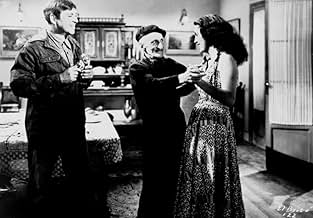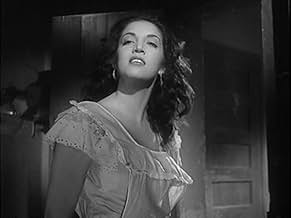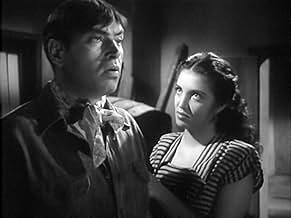A tough young man who helps to evict poor people from their houses falls in love with a girl who lives with her father in a building that's about to be demolished.A tough young man who helps to evict poor people from their houses falls in love with a girl who lives with her father in a building that's about to be demolished.A tough young man who helps to evict poor people from their houses falls in love with a girl who lives with her father in a building that's about to be demolished.
- Awards
- 1 win & 2 nominations total
- Meche
- (as Rosa Arenas)
- El Cojo - Tío de María
- (as G. Bravo Sosa)
- Vecina
- (uncredited)
Featured reviews
Buñuel explores his characteristic themes of lust , jealousy , cruelty, class differences , hypocrisy and corruption . This isn't a typical Buñuel film , though there are some symbolism but no surrealism . Interesting and thought-provoking screenplay by the same Luis Buñuel and his usual Mexican collaborator Luis Alcoriza , being efficiently produced by Oscar Danzigers . After his first French period working in which he directed his two greatest surrealist films , he disappeared below the radar in Mexico on a variety of ultra-low-budget films, few of which made much impact outside Spanish-speaking countries , though many of them are well worth watching ; one of them is this ¨Le Brute¨ or ¨El Bruto¨ . Buñuel was given a strict Jesuit education which sowed the seeds of his obsession with both subversive behavior and gritty human dramas , issues well shown in this picture . Pretty good cast gives fine acting ; it is formed by nice Mexican actors such as Pedro Armendariz as El Bruto , a bouncing to kick out a poor people from their houses , Katy Jurado as a satanic Femme Fatale and the innocent and virginal Rosa Arenas .
The motion picture was stunningly directed by Luis Buñuel who was voted the 14th Greatest Director of all time . This Buñuel's strange film belongs to his Mexican second period ; in fact , it's plenty of known Mexican actors . As Buñuel subsequently emigrated from Mexico to France where filmed other excellent movies . After moving to Paris , at the beginning Buñuel did a variety of film-related odd jobs , including working as an assistant to director Jean Epstein . With financial help from his mother and creative assistance from Dalí, he made his first film , this 17-minute "Un Chien Andalou" (1929), and immediately catapulted himself into film history thanks to its disturbing images and surrealist plot . The following year , sponsored by wealthy art patrons, he made his first picture , the scabrous witty and violent "Age of Gold" (1930), which mercilessly attacked the church and the middle classes, themes that would preoccupy Buñuel for the rest of his career . After his two avant-garde collaborations with fellow surrealist Salvador Dali , his career, though, seemed almost over by the mid-1930s, as he found work increasingly hard to come by and after the Spanish Civil War , where he made ¨Las Hurdes¨ , as Luis emigrated to the US where he worked for the Museum of Modern Art and as a film dubber for Warner Bros . He subsequently went on his Mexican period he teamed up with producer Óscar Dancigers and after a couple of unmemorable efforts shot back to international attention , reappearing at Cannes with ¨Los Olvidados¨ in 1951 , a lacerating study of Mexican street urchins , winning him the Best Director award at the Cannes Film Festival. But despite this new-found acclaim, Buñuel spent much of the next decade working on a variety of ultra-low-budget films, few of which made much impact outside Spanish-speaking countries , though many of them are well worth seeking out . As he went on filming "The Great Madcap" , ¨The brute¨, "Wuthering Heights", ¨El¨ , ¨Susana¨ , "The Criminal Life of Archibaldo De la Cruz" , ¨Robinson Crusoe¨ , ¨Death in the garden¨ and many others . His mostly little-known Mexican films , rough-hewn , low-budget melodramas for the most part , are always thought-provoking and interesting ; being ordinary screenwriter Julio Alejandro and Luis Alcoriza . He continued working there until re-establishing himself in Europe in the 1960s as one of the great directors . And finally his French-Spanish period in collaboration with producer Serge Silberman and writer Jean-Claude Carrière with notorious as well as polemic films such as ¨Viridiana¨ was prohibited on the grounds of blasphemy , ¨Tristana¨ , ¨The Discreet Charm of the Bourgeoisie" , of course , ¨ ¨Belle Du Jour¨ , with all the kinky French sex and his last picture , "That Obscure Object of Desire" .
Pedro Armendariz uses his enormous star power to give an unforgettable performance as the brute, a 'slow thinker' as he calls himself--he's a Victor McLaglen type only a lot sexier. Katy Jurado, the female equivalent of Armendariz in popularity, is wonderfully mendacious here. And Andres Soler as the grasping landlord reminds me so much of Walter Huston; they could have been brothers. Enjoyable to watch, because of the performances, just don't expect the usual Bunuel touches.
Pedro goes to the community in the night and he hits the weak Carmelo that has a bleed and dies. When Pedro meets Carmelo's daughter Meche (Rosa Arenas), he falls in love with her and she moves to his house. But the jealous Paloma does not want to give up on Pedro. "El Bruto" is a melodramatic film by Luis Buñuel with the background of a fight of classes between an abusive and powerful landlord and his poor tenants. In this film, Buñuel does not use his "trademark" – the surrealism – and the story is very simple but engaging. The screenplay is very well written and the direction and performances are top-notch. My vote is seven.
Title (Brazil): "O Bruto" ("The Brute")
Did you know
- TriviaDuring filming, actor Pedro Armendáriz strenuously refused to wear short-sleeved shirts, claiming they were made for pedophiles.
- Quotes
Pedro - El Bruto: You have such ways with me. It's true.
Paloma: Come and look. Here are your clothes, clean and mended. Fix yourself up a little. You always look so sloppy and your hair is always messy. And you show off with an open shirt.
Pedro - El Bruto: That's not true. I lost a button.
Paloma: I'll fix it. It's incredible. Such manliness and yet you're such a baby. You don't seem to be a real man. When Don Andrés scolds you,u you look for a back to hide behind. I could did laughing.
Pedro - El Bruto: Don't say that, ma'am. I love and respect him because he has known me since I was a baby. My mother was Don Pepe's maid. The old man. He was always good to us. He sent me to school, and would hit me if I did something wrong. But when he was in a good mood he gave me candy and allowed to listen to his clock. Somebody once said he was my father. I had a fight over it with some other kids. If he was my father... I'm sure he'd tell me. Don't you think?
Paloma: [El Bruto forces himself upon Paloma] Leave me alone. Let me go.
Pedro - El Bruto: I'll teach you to stop playing with me.
Paloma: You want me to call Andrés? You bastard! What did you think? That I'd allow you to touch me with your dirty hands?
Pedro - El Bruto: Forgive me. I thought that...
Paloma: What, idiot?
Pedro - El Bruto: That you liked me.
Paloma: But you forget something very important. That I have to be willing also.
- How long is The Brute?Powered by Alexa
Details
- Release date
- Country of origin
- Language
- Also known as
- The Brute
- Filming locations
- Production company
- See more company credits at IMDbPro
- Runtime
- 1h 21m(81 min)
- Color
- Aspect ratio
- 1.37 : 1























